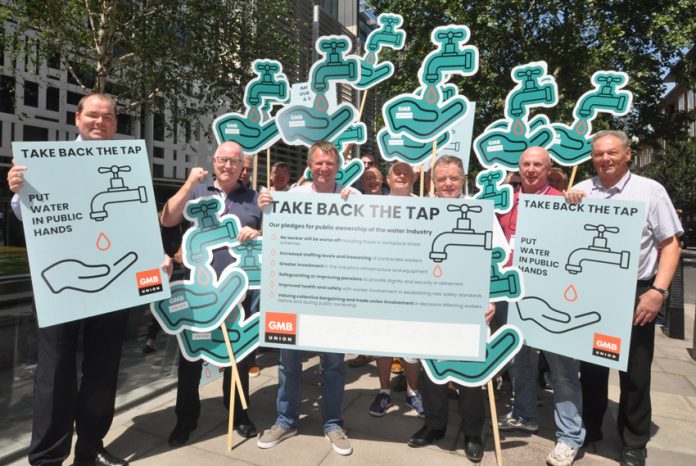
‘RENATIONALISE the water industry,’ demanded GMB water workers from around the country, demonstrating outside the Department for Environment, Food and Rural Affairs (DEFRA) yesterday lunchtime.
As they protested the news broke that as many as six hundred and fifty workers at Thames Water are to lose their jobs!
GMB Officer Stuart Fegan at the protest told News Line: ‘This week sees the thirtieth year since the privatisation of water which has clearly been a monumental mistake.
‘Water bills have increased 40 per cent above inflation, with 2.4 billion litres of treated water being wasted.
‘The massive enrichment of chief executives from what is a natural monopoly is absolutely scandalous.
‘Families face hose pipe bans and all the while shareholders are trousering billions in profit.
‘This is a natural monopoly – the public, workers and our water stocks will be better off if we take back control of our water industry from the profiteers.’
Earlier this week, GMB revealed the nine privatised water companies’ shareholders made more than £6.8 billion in just five years.
And just last week Southern Water was fined £126m in penalties for breaching its statutory duties on sewage treatment, including the ‘deliberate misreporting’ of data, and the dumping of untreated human waste into beaches, rivers and streams.
Meanwhile, as millions face life under a hosepipe ban, GMB figures show 2.4 billion litres of water is wasted through leaks every single day in England.
Last month, GMB figures showed the CEOs of the nine privatised water companies trousered a whopping £68 million in salary, bonuses, pensions and other benefits over the past six years.
While shareholders pocketed these eye-watering sums, consumer water bills in England and Wales have increased by 40% above inflation since privatisation in 1989 according to a report by the National Audit Office.
Meanwhile, six hundred and fifty jobs are to be cut by Thames Water as part of a plan to reduce costs.
The UK’s largest water company, based in Reading, has told 350 members of staff they are at risk of redundancy.
It said a further 300 jobs would ‘potentially’ be removed by not filling vacancies and through terminating contractor roles.